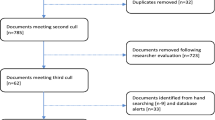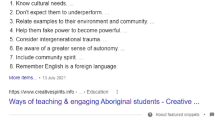Abstract
Outside its heavily-populated south-eastern corner, Queensland is a huge administrative area with many small, remote communities that can be separated by hundreds of kilometres of dirt road, or, in other areas, not accessible by road. In this study, parents, students and teachers in nine schools from rural and regional Queensland were interviewed about their perceptions of school science. Teachers, parents and students defined remoteness by reference to their social ties, as well as the social capital and resources they drew on to teach science meaning that not only did different groups differ in their interpretations of remoteness; different teachers in similar circumstances also responded differently. Science teachers’ responses to remoteness were related to their perceptions of school-community communication and their perceptions of their freedom to innovate. Teachers who felt that remoteness gave them more freedom and recognised opportunities to utilise their environment created innovative and relevant science programmes. Teachers who felt their remoteness gave them less freedom felt isolated from the community were less likely to innovate.
Similar content being viewed by others
References
Baker R., Ambrose B. (1985) The small rural school and in-service provision in science. Research in Rural Education 3, 31–34
Berns B., Century J., Hiles E., Minner D., Moore G. (2003) Science education reform in rural America: A snapshot. National Science Foundation, MA, Newton
Carlsen W., Monk D. (1992) Differences between rural and nonrural secondary science teachers: Evidence from the longitudinal study of American youth. Journal of Research in Rural Education 8, 1–10
Dewey R. (1960) The rural–urban continuum: Real but relatively unimportant. American Journal of Sociology 66, 60–66
Evans T. (2003) Beating around the bush: Reflections on the theme. Journal of Research in Rural Education 18, 170–172
Franklin B., Glascock C. (1998) The relationship between Grade configuration and student performance in rural schools. Journal of Research in Rural Education 14, 149–153
Hawkes M., Halverson P., Brockmueller B. (2002) Technology facilitation in the rural school: an analysis of options. Journal of Research in Rural Education 17, 162–170
Higgins A. (1994) A background to rural education schooling in Australia. Journal of Research in Rural Education 10, 48–57
Khattri N., Riley K., Kane M. (1997) Students at risk in poor, rural areas: A review of the research. Journal of Research in Rural Education 13, 79–100
Lake, D., Faragher, R., Lenoy, M., Sellwood, J., Archer, L., & Anderson, N. (2006). What makes a good teacher? They have respect for our culture. In T. Lyons, (Ed.), Science, ICT and mathematics education in rural and regional Australia: The SiMERR National survey case studies (pp. 123–147). Armidale: National Centre of Science, ICT and Mathematics Education for Rural and Regional Australia, University of New England.
Lyons, T., Cooksey, R., Panizzon, D., Parnell, A., & Pegg, J. (2006). Science, ICT and mathematics education in rural and regional Australia: The SiMERR National survey. Armidale: National Centre of Science, ICT and Mathematics Education for Rural and Regional Australia, University of New England.
Moriarty B., Danaher P., Danaher G. (2003) Situating and interrogating contemporary Australian rural education research. Journal of Research in Rural Education 18, 133–138
Stokes, H., Stafford, J., & Holdsworth, R. (2000). Rural and remote school education: A survey for the human rights and equal opportunities commission. Melbourne: Youth Research Centre, University of Melbourne.
Turpin T., Iredale R., Ngui M., Harrison B., Fox C. (2002) Evaluation of the human rights and equal opportunity commission national inquiry into rural and remote education. Human Rights and Equal Opportunity Commission, Wollongong
Whitaker W. (1983) Conceptualizing “Rural” for research in education: A sociological perspective. Rural Education 1, 71–76
Author information
Authors and Affiliations
Corresponding author
Rights and permissions
About this article
Cite this article
Lake, D. Science education: innovation in rural and remote Queensland schools. Educ Res Policy Prac 7, 123–136 (2008). https://doi.org/10.1007/s10671-007-9038-6
Received:
Accepted:
Published:
Issue Date:
DOI: https://doi.org/10.1007/s10671-007-9038-6




